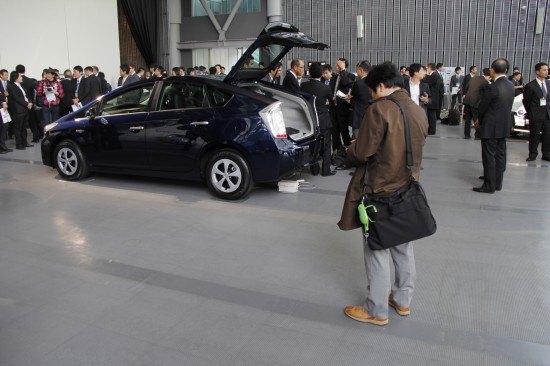Toyota Launches The Volt Worrier: A Prius Plug-In Hybrid That Won't Break The Bank

Toyota capitalized on the pre-Tokyo Motor Show buzz and presented its plug-in hybrid Prius PHV to the press. The car is not quite ready for launch, it will be launched in Japan on January 30, 2012. However, dealers accept orders as of today. The venue of the press conference was carefully chosen: The National Museum of Emerging Science and Innovation.
Toyota sees this car as the “mainstay next-generation eco-vehicle following the EV.”
In carefully chosen words, Toyota managers pooh-poohed the pure plug-in. They pushed the usual buttons, namely range anxiety or time to charge. They subtly dissed the pure plug-in by saying that green vehicles are only good for the environment if they are widely used.
The EV cruising range is not far: 26.4 km, or 16.4 miles. After that, the Prius PHV will switch seamlessly into hybrid mode, using the familiar 1.8 liter series hybrid technology. Why such a short EV range? It is a careful balancing act of weight, space, and price. A big battery adds heft and hefty cost. The Prius PHV is only 50 kg (110 lbs) heavier than the regular Prius. Its lithium-ion battery is small enough to not take away trunk space. Trunk is the same size as that of the Prius. 16 miles is enough to get to the store and back or to roll out of town without polluting the air.
A lot more has been said today. A lot of it is already known to TTAC readers via our interviews with Chief Engineer Satoshi Ogiso. Because there was so much, we make the whole press conference available to you via video as if you’ve been there yourself.
Toyota plans to sell 60,000 Prius PHV a year around the world. 35,000 to 40,000 are scheduled for Japan, the rest for the rest of the world. The car should arrive in the U.S. in Spring at a starting price of $32,000. People in Europe will have to shell out €37,000.
Leave it to Reuters to say why GM should be worried:
“General Motors Co is also looking to win over environmentally conscious consumers with its Volt plug-in hybrid, although its price tag of $41,000 is considered prohibitive.
The Volt also hit a snag recently, with U.S. regulators deciding last week to investigate the safety of the car after its battery pack caught fire in crash tests.
The Volt uses “range extender” technology to generate electricity on-board with the gasoline engine and carries 180 kg (400 lbs) of batteries.”

Bertel Schmitt comes back to journalism after taking a 35 year break in advertising and marketing. He ran and owned advertising agencies in Duesseldorf, Germany, and New York City. Volkswagen A.G. was Bertel's most important corporate account. Schmitt's advertising and marketing career touched many corners of the industry with a special focus on automotive products and services. Since 2004, he lives in Japan and China with his wife <a href="http://www.tomokoandbertel.com"> Tomoko </a>. Bertel Schmitt is a founding board member of the <a href="http://www.offshoresuperseries.com"> Offshore Super Series </a>, an American offshore powerboat racing organization. He is co-owner of the racing team Typhoon.
More by Bertel Schmitt
Latest Car Reviews
Read moreLatest Product Reviews
Read moreRecent Comments
- Spectator Wild to me the US sent like $100B overseas for other peoples wars while we clammer over .1% of that money being used to promote EVs in our country.
- Spectator got a pic of that 27 inch screen? That sounds massive!
- MaintenanceCosts "And with ANY car, always budget for maintenance."The question is whether you have to budget a thousand bucks (or euro) a year, or a quarter of your income.
- FreedMike The NASCAR race was a dandy. That finish…
- EBFlex It’s ironic that the typical low IQ big government simps are all over this yet we’re completely silent when oil companies took massive losses during Covid. Funny how that’s fine but profits aren’t. These people have no idea how business works.





































Comments
Join the conversation
A couple things missed. That 16 miles is (essentially) the Euro city cycle test. The Volt does 51 or 52 on the same test. The PHEV Prius is blended PHEV. If you accelerate too hard (more than 40hp worth IIRC), the engine turns on. The Prius fan club assures this is somehow better. Maybe it is, unless you want to buy a car that can run EV all the time. The Volt runs EV exclusively until the battery is exhausted (yeah, there are a few possible exceptions but I've never encountered them. my volt has had one problem in 9 months. A sticky charge door. Yes it tripped a CEL. Fixed under warranty without issue.
A big difference between a Volt and a plug-in Prius, is that the Volt has "full performance" on battery power, while the Prius has much less electric motor power available, and will crank up the ICE at any time, if you floor it. The bottom line is that the Volt makes relatively more sense for people who do almost all their driving within electric-only range. If you do a lot of driving beyond electric range, the plug-Prius would be better, even at the same price, because it gets much better mpg on gas. As far as equipment, the "base" Prius plug-in is very well equipped, at least by my standards. Even my base regular Prius, about $23.5K MSRP is well equipped, with auto temp control, "smart key," and other features that were only on more expensive cars just a few years ago. In addition, the base plug-in Prius has nav, bluetooth connectivity, satellite radio, back up camera, and maybe some other stuff I missed. My car is a 2010, so it may be missing a couple things that a current base Prius has, like bluetooth.